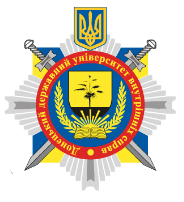ANALYSIS OF LEGAL FORMS OF UNITED NATIONS WORK IN THE FIELD OF TRANSITIONAL JUSTICE
DOI:
https://doi.org/10.32782/2523-4269-2022-80-3-8-12Keywords:
protection of human rights, international legal acts, directions and principles, United Nations, legal forms of work, post-conflict development, transitional justice, social upheavals.Abstract
The article provides a comprehensive analysis of legal forms of United Nations work in the field of transitional justice. The author notes that the mechanisms of transitional justice, which are implemented in Ukraine today, largely depend on the legal forms of the work of the United Nations in the conditions of transitional processes. Moreover, these forms make it possible to speed up the peacebuilding process and expand the functional capabilities of national institutions involved in this process. The following legal forms of the work of the United Nations in the field of transitional justice were studied: 1) creation of United Nations tribunals in post-conflict states; 2) assistance in concluding peace agreements by the parties to the conflict; 3) field representation to assist states in developing transition strategies; 4) protection of certain categories of conflict victims (children, women, civilians); 5) ensuring the right to compensation; 6) creation of temporary United Nations administrations; 7) assistance in the reintegration of alienated members of communities; 8) assistance in documenting human rights violations and violence in post-conflict states. The author systematizes the following features of the studied legal forms: interdependence and interdependence, singleness and purposefulness, organizational and legal embodiment, direct connection with actors and national context. The author divides all researched legal forms of United Nations work in the field of transitional justice into three groups: a) post-conflict (their implementation takes place in conditions when transitional processes have already begun, and there are certain peace agreements between the parties to the conflict, although sometimes they are quite fragile); b) pre-conflict (implemented before the beginning of the active phase of the conflict in order to minimize its occurrence or to delay it as much as possible and consist in working with factors that can lead to escalation and further development of the confrontation); c) accompanying (applied in the conflict process to solve the priority tasks of transitional justice and related to the solution of urgent tasks in the interests of certain target groups).
References
The rule of law and transitional justice in conflict and post-conflict societies : Report of the Secretary-General. 23 August 2004 S/2004/616*.
Meernik J.D., Nichols A., King K.L. The Impact of International Tribunals and Domestic Trials on Peace and Human Rights After Civil War. International Studies Perspectives. 2010. Vol. 11. № 4. Р. 309–334.
Bartels R. The Classification of Armed Conflicts by International Criminal Courts and Tribunals. International criminal law review. 2020. Vol. 20. Р. 596–668.
Концептуальна записка для обговорення в Раді Безпеки на тему «Миробудування та підтримка миру: правосуддя перехідного періоду в умовах конфлікту та у постконфліктних ситуаціях» : лист Постійного представника Бельгії при Організації Об’єднаних Націй від 4 лютого 2019 р. на ім’я Генерального секретаря ООН. S/2020/98*.
Report of the Special Rapporteur on the promotion of truth, justice, reparation and guarantees of non-recurrence, Pablo de Greiff: General Assembly United Nations, 7 September 2015. A/HRC/30/42.
Turner C. Deconstructing Transitional Justice. Law Critique. 2013. Vol. 24. Р. 193–209.
João Carapêto M. Challenges and Proposals on Transitional Justice Mechanisms. URL: https://www.researchgate.net/ publication/310507555_Issues_challenges_and_proposals_on_Transitional_Justice_mechanisms (access date: 24.08.2022).
Jamar A., Bell Ch. Transitional justice and Peace Negotiations with a Gender Lens. New York : University of Edinburgh, 2018. 28 р.
Scott A. The United Nations Peacebuilding Commission: An Early Assessment. Journal of Peacebuilding & Development. 2008. Vol. 4. Р. 7–16.
Berdal M. The UN Peacebuilding Commission: The Rise and Fall of a Good Idea. Critical Perspectives on the Political Economy of Peacebuilding. 2008. Vol. 11. Р. 356–372.
Kazazi M. United Nations Compensation Commission and Liability for Use of Force. ZaöRV. 2018. Vol. 78. Р. 603–607.
Basic Principles and Guidelines on the Right to a Remedy and Reparation for Victims of Gross Violations of International Human Rights Law and Serious Violations of International Humanitarian Law : United Nations Doc. A/RES/60/147 on 21 March 2006.
Townsend G. The United Nations Compensation Commission: Mass Reparations Apotheosis. Loy. L.A. Int’l & Comp. L. Rev. 2020. Vol. 31. Р. 325–344.
Torture and other cruel, inhuman or degrading treatment or punishment: rehabilitation of torture victims : Resolution adopted by the Human Rights Council on 12 April 2013 A/HRC/RES/22/21.
Measuring the effectiveness of the support provided by the United Nations system for the promotion of the rule of law in conflict and post-conflict situations : Report of the Secretary-General Security Council on 11 June 2013 S/2013/341*.
Forster R. Interim Governance Arrangements in Post-Conflict and Fragile Settings: Sixth Edinburgh Dialogue on Post-Conflict Constitution-Building. Stockholm : UK Foreign, Commonwealth & Development Office, 2019. 45 p.
Disarmament, demobilization and reintegration : Report of the Secretary-General General Assembly United Nations on 2 March 2006 A/60/705.
Consolidation of peace through practical disarmament measures : Resolution adopted by the General Assembly United Nations on 12 January 2009 A/RES/63/62.





